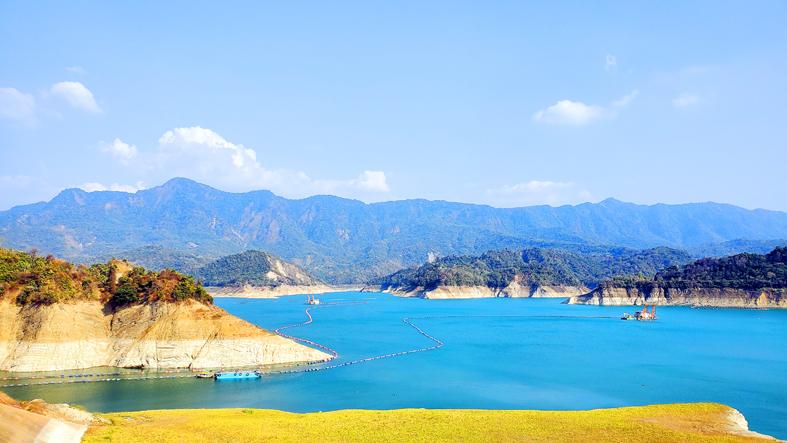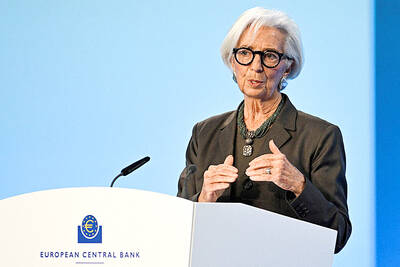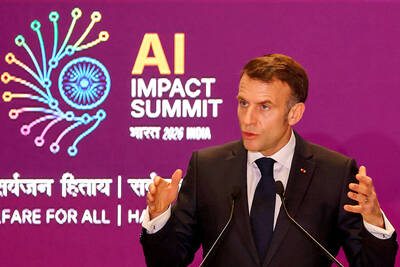A major trade group yesterday called on the government to use water surcharges only as a last resort to encourage water conservation, saying that the measure would not resolve ongoing water shortages and would increase corporate operating costs.
As Taiwan faces its worst water shortage in 56 years, government officials have revived talks about imposing water surcharges on heavy water users — namely manufacturers of electronics, and steel and textile products, as well as dyeing and finishing service providers.
Minister of Economic Affairs Wang Mei-hua (王美花) yesterday told a legislative hearing that the ministry would draw up a bill by the end of this year to pave the way for water surcharges to be collected next year, at the earliest.

Photo: Chang Chung-yi, Taipei Times
Rock Hsu (許勝雄), chairman of the Third Wednesday Club (三三會), a trade group whose membership is limited to the top 100 firms in each business sector, said that the government should boost water management efficiency and only use water surcharges as a last resort.
“Taiwan can learn from Israel, a world leader in water technology and innovation, by pouring funds into infrastructure projects to make the most use of its water resources,” Hsu told reporters before the club’s monthly gathering.
Hsu, who is also the founder of Compal Electronics Inc (仁寶電腦), the world’s No. 2 contract laptop maker, said that electronics firms, especially semiconductor makers, are heavy water users and are concerned that the shortage might affect their production.
Taiwan ranks high globally with regards to precipitation, but there is a lot of room for improvement in its handling of water shortages, and transporting water from the mountains to areas lacking water, Hsu said, adding that he has long promoted the idea of desalination.
Water surcharges would not help increase the nation’s water supply, but would add to manufacturers’ production costs, running contrary to the government’s efforts to attract investment, he said.
Local technology firms, such as Taiwan Semiconductor Manufacturing Co (台積電), have made a great effort to reuse their wastewater, Hsu added.
The government should rather approach the issue from the perspective of enhancing water management efficiency, he said.
Hsu also urged the government to speed up the COVID-19 vaccination process, as the US and European countries might soon vaccinate the bulk of their population and resume normal economic activity.
“Taiwan might then be isolated on the world stage owing to it not having access to vaccines,” Hsu said, adding that the authorities should be more flexible when buying vaccines and grooming local vaccine developers.
The trade group also said that it wants to visit Japan and China toward the end of this year.

European Central Bank (ECB) President Christine Lagarde is expected to step down from her role before her eight-year term ends in October next year, the Financial Times reported. Lagarde wants to leave before the French presidential election in April next year, which would allow French President Emmanuel Macron and German Chancellor Friedrich Merz to find her replacement together, the report said, citing an unidentified person familiar with her thoughts on the matter. It is not clear yet when she might exit, the report said. “President Lagarde is totally focused on her mission and has not taken any decision regarding the end of

French President Emmanuel Macron told a global artificial intelligence (AI) summit in India yesterday he was determined to ensure safe oversight of the fast-evolving technology. The EU has led the way for global regulation with its Artificial Intelligence Act, which was adopted in 2024 and is coming into force in phases. “We are determined to continue to shape the rules of the game... with our allies such as India,” Macron said in New Delhi. “Europe is not blindly focused on regulation — Europe is a space for innovation and investment, but it is a safe space.” The AI Impact Summit is the fourth

CONFUSION: Taiwan, Japan and other big exporters are cautiously monitoring the situation, while analysts said more Trump responses ate likely after his loss in court US trading partners in Asia started weighing fresh uncertainties yesterday after President Donald Trump vowed to impose a new tariff on imports, hours after the Supreme Court struck down many of the sweeping levies he used to launch a global trade war. The court’s ruling invalidated a number of tariffs that the Trump administration had imposed on Asian export powerhouses from China and South Korea to Japan and Taiwan, the world’s largest chip maker and a key player in tech supply chains. Within hours, Trump said he would impose a new 10 percent duty on US imports from all countries starting on

STRATEGIC ALLIANCE: The initiative is aimed at protecting semiconductor supply chain resilience to reduce dependence on China-dominated manufacturing hubs India yesterday joined a US-led initiative to strengthen technology cooperation among strategic allies in a move that underscores the nations’ warming ties after a brief strain over New Delhi’s unabated purchase of discounted Russian oil. The decision aligns India closely with Washington’s efforts to build secure supply chains for semiconductors, advanced manufacturing and critical technologies at a time when geopolitical competition with China is intensifying. It also signals a reset in relations following friction over energy trade and tariffs. Nations that have joined the Pax Silica framework include Japan, South Korea, the UK and Israel. “Pax Silica will be a group of nations